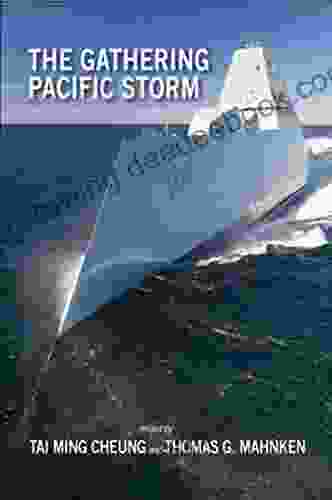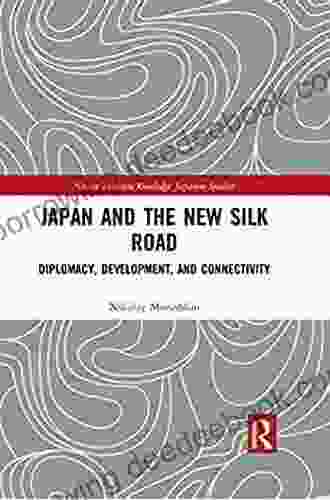Diplomacy, Development and Connectivity: The Nissan Institute / Routledge Japanese Studies Series

The Asia-Pacific region is undergoing a period of profound change. The rise of China, the changing global order, and the increasing interconnectedness of the region are all having a major impact on the way that diplomacy is conducted. This book explores the evolving role of diplomacy in the Asia-Pacific region, with a particular focus on the role of Japan.
The book is divided into three parts. The first part examines the changing nature of diplomacy in the Asia-Pacific region. The second part looks at how diplomacy is being used to promote development and connectivity. The third part provides a detailed analysis of Japan's foreign policy and its relations with its neighbors.
4.8 out of 5
| Language | : | English |
| File size | : | 1903 KB |
| Text-to-Speech | : | Enabled |
| Enhanced typesetting | : | Enabled |
| Print length | : | 242 pages |
| Screen Reader | : | Supported |
| X-Ray for textbooks | : | Enabled |
The Changing Nature of Diplomacy in the Asia-Pacific Region
The traditional model of diplomacy, based on bilateral relations between states, is no longer adequate to meet the challenges of the 21st century. The rise of new powers, the changing global order, and the increasing interconnectedness of the region have all led to a more complex and fluid diplomatic landscape.
In the Asia-Pacific region, the rise of China is the most significant factor shaping the changing nature of diplomacy. China's growing economic and military power has led to a reassessment of the regional order. Traditional powers, such as the United States and Japan, are adjusting to China's rise, while new powers, such as India and Indonesia, are seeking to play a greater role in regional affairs.
The changing global order is also having a major impact on diplomacy in the Asia-Pacific region. The end of the Cold War and the rise of globalization have led to a more interconnected and interdependent world. This has made it more difficult for states to pursue unilateral policies. Instead, states are increasingly cooperating with each other to address common challenges, such as climate change and terrorism.
The increasing interconnectedness of the Asia-Pacific region is also having a major impact on diplomacy. The growth of trade and investment, the spread of technology, and the movement of people are all creating new opportunities for cooperation. However, they are also creating new challenges, such as environmental degradation and transnational crime.
Diplomacy for Development and Connectivity
Diplomacy is playing an increasingly important role in promoting development and connectivity in the Asia-Pacific region. Governments are using diplomacy to negotiate trade and investment agreements, to promote infrastructure development, and to cooperate on regional issues.
Trade and investment are essential for economic development. Diplomacy can help to create a favorable environment for trade and investment by negotiating agreements that reduce tariffs and other barriers. It can also help to promote investment by providing investors with access to information and by protecting their rights.
Infrastructure development is another key driver of economic development. Diplomacy can help to finance and build infrastructure projects, such as roads, railways, and ports. It can also help to ensure that these projects are sustainable and that they benefit the local communities.
Regional cooperation is essential for addressing common challenges and promoting sustainable development. Diplomacy can help to build trust and cooperation between countries, and it can provide a framework for negotiating agreements on regional issues.
Japan's Foreign Policy and Relations with Its Neighbors
Japan is a key player in the Asia-Pacific region. It is a major economic and military power, and it has a long history of diplomatic engagement with its neighbors. Japan's foreign policy is based on the principles of peace, cooperation, and free trade.
Japan has close relations with the United States, its most important ally. The two countries cooperate on a wide range of issues, including security, trade, and climate change. Japan also has close relations with its neighbors in the Asia-Pacific region, including China, South Korea, and India.
Japan's relations with China are complex and often fraught with tension. The two countries have a long history of conflict, and they have competing claims to territory in the East China Sea. However, Japan and China are also major trading partners, and they have a shared interest in maintaining peace and stability in the region.
Japan's relations with South Korea are also complex. The two countries have a long history of cooperation, but they also have a number of unresolved historical issues. These issues include the treatment of Korean forced laborers during World War II and the sovereignty of the Dokdo Islands.
Japan's relations with India are growing in importance. The two countries are cooperating on a range of issues, including security, trade, and climate change. India is also a key partner in Japan's "Free and Open Indo-Pacific" strategy, which aims to promote peace and stability in the region.
The Asia-Pacific region is undergoing a period of profound change. The rise of China, the changing global order, and the increasing interconnectedness of the region are all having a major impact on the way that diplomacy is conducted. This book has explored the evolving role of diplomacy in the Asia-Pacific region, with a particular focus on the role of Japan.
Diplomacy is playing an increasingly important role in promoting development and connectivity in the Asia-Pacific region. Governments are using diplomacy to negotiate trade and investment agreements, to promote infrastructure development, and to cooperate on regional issues. Japan is a key player in the Asia-Pacific region. It is a major economic and military power, and it has a long history of diplomatic engagement with its neighbors. Japan's foreign policy is based on the principles of peace, cooperation, and free trade.
The future of diplomacy in the Asia-Pacific region is uncertain. However, it is clear that diplomacy will continue to play an important role in shaping the region's future.
4.8 out of 5
| Language | : | English |
| File size | : | 1903 KB |
| Text-to-Speech | : | Enabled |
| Enhanced typesetting | : | Enabled |
| Print length | : | 242 pages |
| Screen Reader | : | Supported |
| X-Ray for textbooks | : | Enabled |
Do you want to contribute by writing guest posts on this blog?
Please contact us and send us a resume of previous articles that you have written.
 Novel
Novel Page
Page Genre
Genre Reader
Reader Library
Library Paperback
Paperback E-book
E-book Shelf
Shelf Bibliography
Bibliography Foreword
Foreword Preface
Preface Manuscript
Manuscript Codex
Codex Tome
Tome Library card
Library card Narrative
Narrative Autobiography
Autobiography Memoir
Memoir Reference
Reference Thesaurus
Thesaurus Narrator
Narrator Character
Character Resolution
Resolution Librarian
Librarian Catalog
Catalog Stacks
Stacks Archives
Archives Periodicals
Periodicals Study
Study Research
Research Scholarly
Scholarly Lending
Lending Reserve
Reserve Journals
Journals Rare Books
Rare Books Special Collections
Special Collections Study Group
Study Group Storytelling
Storytelling Book Club
Book Club Textbooks
Textbooks Judy Leigh Moore
Judy Leigh Moore Mikael Mansur Martinelli
Mikael Mansur Martinelli Alistair Mcdowall
Alistair Mcdowall Kurt Schlichter
Kurt Schlichter Sandra Mccormick
Sandra Mccormick Monika Krause
Monika Krause Sean Thor Conroe
Sean Thor Conroe Jeff Evans
Jeff Evans Debal Banerjee
Debal Banerjee John O Mcginnis
John O Mcginnis Jane Brocket
Jane Brocket Jennifer Barclay
Jennifer Barclay Susie Nelson
Susie Nelson Mike Mathis
Mike Mathis Alastair Walker
Alastair Walker Lisa Donovan Lukas
Lisa Donovan Lukas Phenyo Caiphus
Phenyo Caiphus Terry Goodkind
Terry Goodkind C Turner
C Turner Sharee Stover
Sharee Stover
Light bulbAdvertise smarter! Our strategic ad space ensures maximum exposure. Reserve your spot today!

 F. Scott FitzgeraldUnraveling the Intricate Legacy of "The Apprentice: Rizzoli & Isles"...
F. Scott FitzgeraldUnraveling the Intricate Legacy of "The Apprentice: Rizzoli & Isles"... Matthew WardFollow ·8.6k
Matthew WardFollow ·8.6k Jerome PowellFollow ·7.1k
Jerome PowellFollow ·7.1k Chadwick PowellFollow ·8.8k
Chadwick PowellFollow ·8.8k Michael CrichtonFollow ·3.4k
Michael CrichtonFollow ·3.4k Melvin BlairFollow ·17.8k
Melvin BlairFollow ·17.8k Branden SimmonsFollow ·9.5k
Branden SimmonsFollow ·9.5k Tom ClancyFollow ·16.6k
Tom ClancyFollow ·16.6k Salman RushdieFollow ·15.2k
Salman RushdieFollow ·15.2k

 Darius Cox
Darius CoxThe Gathering Pacific Storm: An Epic Struggle Between...
The Gathering...

 Hugo Cox
Hugo CoxHow CIA-Contra Gangs and NGOs Manufacture, Mislabel, and...
In the annals of covert operations, the CIA's...

 Finn Cox
Finn CoxDr. Brandt's Billionaires Club Series: The Ultimate...
A Journey into the Pinnacle of...

 Isaac Asimov
Isaac AsimovCurrent Affairs Daily Digest 20180730 30th July 2024
National ...

 Felix Carter
Felix CarterBroadway Celebrates The Big Apple Over 100 Years Of Show...
Broadway Celebrates the Big Apple: Over 100...

 Beau Carter
Beau CarterThe Big Book of Flute Solos: A Comprehensive Collection...
If you're a flute player,...
4.8 out of 5
| Language | : | English |
| File size | : | 1903 KB |
| Text-to-Speech | : | Enabled |
| Enhanced typesetting | : | Enabled |
| Print length | : | 242 pages |
| Screen Reader | : | Supported |
| X-Ray for textbooks | : | Enabled |










